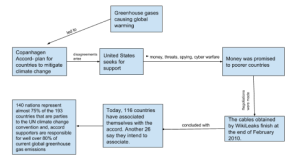I started out my diagram by explaining how greenhouse gases are affecting climate change and the World Powers produced the Copenhagen Accord in order to fix the problem by mitigating climate change. The U.S. needed support for the plan so they set out to get this support by threatening, bribing with money, cyber war faring, and spying on other countries. The United States wasn’t the only country that was using progressive actions in order to gain support. Money was promised and negotiations were made, some countries supported the plan and others didn’t. The major let down to this accord that I didn’t go into much detail with on my graph was that the Dutch refusing to join due to the fact that they didn’t want to use financial aid for political reasons, but on a positive note Saudi Arabia did join the accord which was a major benefit, because they are the number one producer of petroleum. Saudi Arabia agreed that it was good thing and no key economic interests were going to be compromised. The cables attained by the WikiLeaks finished at the end of February 2010. Today 116 countries have associated themselves with the accord, and another 26 say they attend to associate. In conclusion, according to the article 140 nations represent almost 75% of the 193 countries that are parties to the UN climate change convention and, accord supporters are responsible for well over 80% of current global greenhouse gas emissions which is a huge success.
After reading the WikiLeak article and the module 9 information I have been informed how climate change is a large growing problem, and actions need to be taken in order to fix it. These changes in climate are caused mainly by human emissions of greenhouse gases. Climate change can lead to temperature shifts, shifts in water, and cause extreme weather events. It can sometimes be hard to adapt to these changes. Something has to be done, and the efforts of the U.S. and the Copenhagen Accord were very successful in my opinion, but not the most ethical. I don’t believe they had to threaten and spy on other countries in order to gain support, it was seen as inappropirate. Also, instead of stating in the cable, “sign the accord or discussion ends now,” the State Department could have negotiated differently to make the conditions fair for each side. Overall, compromises could have been made in a more ethical way. I’m not really sure what approach I would have taken, but it could have been dealt with differently with maybe a meeting or press conference where everything could be set out on the table. As I read Module 9 it mentioned how climate change is a collective action problem, this means everyone should be working together to fix the issue and be on the same page. It is affecting us all and it should be in everyone’s best interest to solve these problems in the right way, with the help from all the different countries.


Hi Rachael, my name is Sabrina and my blog post can be found at http://geog030.dutton.psu.edu/2016/04/05/module-9-climate-change-2/ .
I agree that the Copenhagen Accord was successful in the way that it brought attention to the subject that longed for attention from the public and population from the Earth, however I also believe that the attention that the Copenhagen Accord would not have ben reached without the unethical events taking place. In no way am I condoning the use of spying and threatening, but in the long run the Copenhagen Accord is most known for the cable leaks and threatening. I agree with you when you say that if we want the best possible outcome we must use collective action in order to reach it. I also believe that it requires a combination of both collective and individual action.
Hi, Rachael, great diagram and blog. Here is a link to mine if you get a chance https://wp.me/p3RCAy-dD7
I personally believe that the Copenhagen accord was far to lax in its approach to curtail GHG emissions. By allowing individual governments to monitor themselves and set their own “palatable” limits on GHG reductions, no substantial amount of net emission reduction will be seen. The ted-talk video in this lesson did an excellent job in illustrating the immediate need for an aggressive reform on our current levels. Great video, I watched it twice. Thanks again.